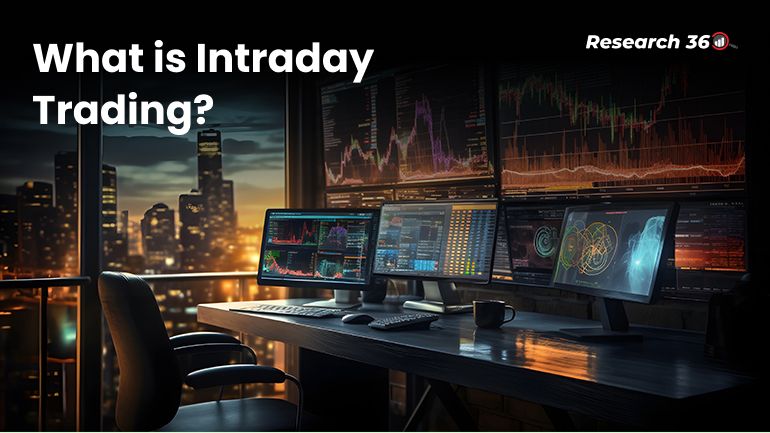What is Intraday Trading?

- What is Intraday Trading and How Does it Work?
- How is Intraday Trading Different From Regular Trading?
- What are the Features and Characteristics of Intraday Trading?
- What are the Advantages of Intraday Trading?
- What are the Disadvantages of Intraday Trading?
- Things to Keep in Mind When Trading Intraday
- Conclusion
Intraday trading is one of the most popular trading methods in the stock market. Compared to other trading techniques, it is riskier and involves high concentration, focus and discipline. However, it also has several advantages and may even provide higher returns on your investment. Here’s everything you need to know about this particular style of trading.
What is Intraday Trading and How Does it Work?
Intraday trading refers to the practice of purchasing and selling an asset within the same trading day to capture small price movements. Traders who use this method square off all their positions by the close of a trading day and don’t hold onto their positions overnight. Intraday trading is available in almost all types of financial instruments such as equity shares, equity derivatives contracts like futures and options, commodities and currencies.
Now, let’s look at a hypothetical example to better understand this unique concept.
Assume that you wish to capture the price movements in a particular stock, say Infosys Limited. You purchase 100 units of the stock for Rs. 1,300 per share. Within just a few hours, the share price increases to Rs. 1,320 per share. At this point, you square off your position by selling the 100 shares in Infosys Limited. The profit from the trade is Rs. 2,000 (Rs. 20 x 100 shares).
Since you bought and sold the stock within the same day, you've essentially executed an intraday trade.
How is Intraday Trading Different From Regular Trading?
Usually, when you purchase a company’s shares, they’re credited to your demat account within T+1 days. So, if you purchase shares on a Monday, they will be available in your demat account by Wednesday.
In a regular trade (also known as a delivery trade), the shares you purchase are delivered to your demat account following the T+1 trade settlement protocol. However, in the case of an intraday trade, since you sell the shares within the same day as you bought them, the shares you purchase are not delivered to your demat account.
What are the Features and Characteristics of Intraday Trading?
Now that you’ve seen what intraday trading is, here’s a glimpse of some of the key characteristics of this trading method.
Short Holding Period
The primary characteristic of intraday trading is the short holding period. As you’ve already seen, traders don’t hold their positions for more than a day. All positions are closed before the trading day ends. Some experienced high-volume intraday traders initiate multiple positions simultaneously and don’t hold them for more than a few minutes.
Leverage
The extensive use of leverage is another major feature of intraday trading. Stockbrokers often provide intraday traders with the option to utilize leverage. Leverage is the ability to enter into large positions by depositing just a fraction of the total trade value. While this may amplify your profits, it can also lead to magnified losses if the position moves against your expectation.
Volatility and Liquidity
Volatility and liquidity are two important parts of intraday trading. Highly volatile assets tend to move more quickly, making them the perfect candidates for intraday trades. Meanwhile, highly liquid assets make entering and exiting positions a lot easier.
Fast Execution
Intraday trading requires quick decision-making skills and fast trade executions to capture small price movements in an asset. This also allows traders to execute multiple trades throughout the day to take advantage of the various market opportunities.
What are the Advantages of Intraday Trading?
Intraday trading offers a multitude of different benefits to traders. Here’s a closer look at some of the key benefits of this trading method.
Quick Profits
With regular trading, it can take anywhere from a few days to weeks to realize any profits. However, with intraday trading, you get to make quick and instant profits provided your strategies are successful.
Zero Overnight Risk
Overnight risk refers to the risk of a position going into losses due to adverse events or news that appear after a trading session. Since intraday traders don’t hold their positions overnight, they’re immune to overnight risk.
Flexibility
Intraday trading offers a lot of flexibility to traders. They have the freedom to choose their asset class and the kind of strategy that they wish to execute based on their skills, experience and expertise.
No Need to Focus on Long-Term Trends
Intraday traders don’t usually pay attention to long-term trends. Instead, they focus only on short-term trends and technical analysis to frame trading strategies and risk management plans.
What are the Disadvantages of Intraday Trading?
As with any other trading method, intraday trading also has a few disadvantages. Knowing what they are can help you easily determine whether this method is suitable for you or not.
Highly Risky
Since assets that are suitable for intraday trading require a certain level of volatility, the method is often considered highly risky. The high levels of volatility can lead to rapid price movements, making it hard to predict market movements.
Emotionally Demanding
Intraday trading requires quick decision-making skills and the processing of a lot of real-time market information. The fast-paced nature can be emotionally draining and may lead to impulsive trading decisions.
Limited Profit Potential
The amount of profit that you get to make with an intraday trade is usually low. It is, for this reason, that most traders who adopt this method execute multiple trades in a day.
Transaction Costs
Executing multiple intraday trades can lead to higher transaction costs. The brokerage and other fees can add up and may even reduce your profits significantly.
Things to Keep in Mind When Trading Intraday
If you plan to try intraday trading shortly, here are a few things you should consider.
Determine Your Position Size
Having a large position size can make it harder to execute a trade at your intended price, whereas a small position size will produce very little profit. Therefore, it is important to determine the right position size before trading intraday.
Have a Proper Risk Management Plan
A proper risk management plan can help limit losses if the position moves against your expectations. Stop-loss trades are one of the best ways to reduce your losses.
Research Thoroughly
Intraday trading primarily revolves around the use of technical analysis. So, make sure to analyze and research the asset that you wish to trade intraday thoroughly. This can help you find the right trading opportunities and assess risks more accurately.
Closely Monitor News and Events
Market news, economic events and corporate announcements have the potential to impact an asset's price in the short term. Keeping a close watch on such market-moving events may make intraday trading more successful.
Conclusion
Intraday trading requires patience, discipline and a strong commitment to continuous learning and improvement. This makes it more suitable for experienced traders. However, if you’re a new or inexperienced trader wanting to try intraday trading, consider starting with small positions. You may also use virtual trading accounts to practice and gain experience before moving on to real-time trading.
- What is Intraday Trading and How Does it Work?
- How is Intraday Trading Different From Regular Trading?
- What are the Features and Characteristics of Intraday Trading?
- What are the Advantages of Intraday Trading?
- What are the Disadvantages of Intraday Trading?
- Things to Keep in Mind When Trading Intraday
- Conclusion


















